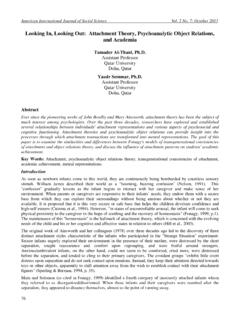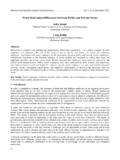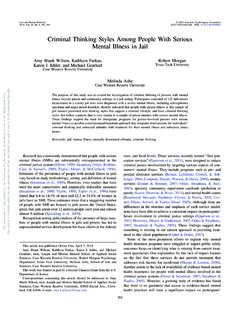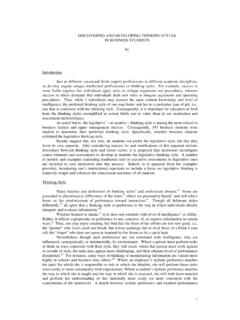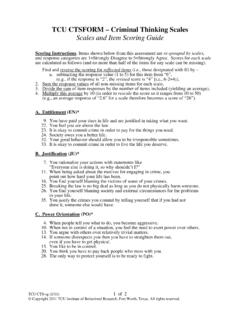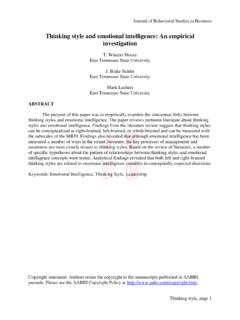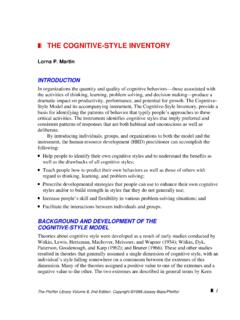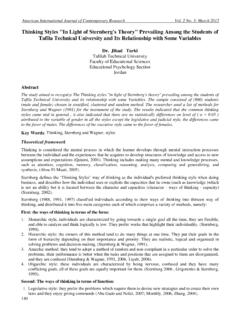Transcription of Investigating the Relationship between Students’ Thinking ...
1 American International Journal of Social Science Vol. 3 No. 2; March 2014 172 Investigating the Relationship between Students Thinking styles , self - efficacy for Learning, and Academic Performance at Qatar University Alanood Al-Thani, * Tamader Al-Thani, * YassirSemmar, * Abstract Individual differences play an integral role in the academic achievement of university students. Pasts studies have focused on a number of factors that have impacted academic performance, such as intelligence, attitudes, self -esteem, and self -concept, just to name a few.
2 In recent years, the roles of Thinking styles and self - efficacy in relation to academic achievement have received much attention from researchers, educators and psychologists alike ( , Shkullak, 2013, Li, 2012, Sternberg, 1997; Honey, 1992).The purpose of this study was is two folds: First, to analyze if variations of Thinking styles and self - efficacy for learning exist among students based on their academic year, colleges, nationality, and number of credit hours completed. Two, to gain new insight into related the Relationship between students Thinking styles , self - efficacy for learning, and academic achievement at Qatar University.
3 Thinking styles and Academic achievement A Thinking style is defined as n individual s preference for a specific Thinking process (Zang et al, 2013). Thinking styles have two dimensions: Cognitive and affective. The cognitive dimension is related to the use of strategies for reasoning and problem solving acquired by experience. The affective dimension has to do with how the person s interests and attitudes affect them (Zhang et al,2006).Kolb and others (1981) defined learning styles as beliefs, preferences and behaviors that people utilize in order to learn in certain conditions ( ).
4 Kolb (1976) affirmed that efficient learners use four learning modes. These include concrete experience, reflective observation, abstract conceptualization and active experimentation. He also categorized four learning styles : Converger, diverger, assimilator and accommodator. Kolb (1984) proposed that an individual develops a preference for a learning style in a certain method and that she or he may implement different styles in different conditions, but may prefer a learning style to another to solve a particular problem. The choice depends on the person s learning experience, the environment and abilities.
5 Kolb suggested that learning improves when the content is presented in a way consistent with the person s preferred Thinking style. Table (1) shows Relationship between learning style and learning situations. Table 1: The Relationship between learning style and learning situations Learning style Situations in which students learn better Assimilators presented with sound logical theories Convergers provided with practical applications of concepts and theories Accommodators allowed to gain 'hands on' experience Divergers allowed to observe and gather a wide range of information (Adapted from Kolb, 1984) Several studies have revealed that Thinking styles are linked to creativeness, problem solving, decision-making, and academic achievement ( , Zhang & Zhua, 2011).
6 Other studies have shown that parents Thinking styles play an important role in their children s Thinking styles (Emamipoor et al, 2004). ----------------------- *Qatar University, Doha, Qata Center for Promoting Ideas, USA 173 Zhang (2002) relied on Sternberg's theory of Thinking styles and Perry's theory of cognitive development to investigate the relation between Thinking style and cognitive development in Hong Kong University. Eighty-two students responded to the two inventories. Results of the study corroborated the Relationship between the Thinking style and cognitive development.
7 In other words, students using higher Thinking levels level had a tendency to use a wider range of Thinking styles than students who were at a lower cognitive level. Bernardo and his colleagues (2002) tried to apply Sternberg's (1988, 1997) theory of mental self -government applies to a non-Western culture. 429 Filipino university students responded to the inventory. The results of study showed a relation between Thinking styles and grade point average, which supports the proposed link between Thinking styles and academic achievement. Being aware of the students Thinking styles , teachers could help them to know their learning habits, and help them to apply better learning strategies.
8 Moreover, teachers can create a better and more attractive learning environment by being familiar with the methods, resources, and conditions in which students learn better and using these efficiently and effectively. self - efficacy and Academic Achievement Albert Bandura defined self - efficacy as beliefs in one s capabilities to organize and execute the courses of action required to produce given attainments (Bandura, 1997, p. 193). Bandura (1998) assumed that the initiation of a task is determined by the level of self - efficacy , the quantity of effort that will be exhausted and the level of persistence to complete the task when an individual faces obstacles and aversive experiences.
9 Various studies have shown that there is a positive and significant correlation between self - efficacy and academic performance (Bandura; 1997: Jones, 2010; Lodewyk, 2005; Lewix, 2011). These studies have revealed that the higher the sense of self - efficacy of a student, the better his or her academic achievement is regardless of sex, nationality or demographic status. In the same vein, Schunk (2003) also provided additional support for the impact of self - efficacy on student educational achievement. He stated that a student s self - efficacy beliefs influence such achievements behaviors as choice of tasks, effort, persistence, and achievement (p.)
10 165). A decade later, Shkullak (2013) found a significant Relationship between the students self - efficacy and academic performance in a study of 280 Albanian university students. Findings also revealed no significant differences in self - efficacy between male and female participants. In a study that investigated the influence of learning styles and self - efficacy on the academic performance of Malaysian candidates enrolled in a Mater s of Business Administration (MBA) program, Rashid (2004) revealed that the 122 participants with different learning styles did not differ in their academic performance.


